1 Answer Base case For n = 5, we have 25 = 32 > = 4(5) Inductive hypothesis Suppose that 2k > 4k for some integer k ≥ 5 Induction step We wish to show that 2k1 > 4(k 1) Indeed, We have supposed true for k and shown true for k 1 Thus, by induction, 2n > 4n for all integers nProve that 3 n > n 2 for n = 1, n = 2 and use the mathematical induction to prove that 3 n > n 2 for n a positive integer greater than 2 Solution to Problem 5 Statement P (n) is defined by 3 n > n 2 STEP 1 We first show that p (1) is true Let n = 1 and calculate 3 1 and 1 2 and compare them 3 1 = 3 1 2 = 1 3 is greater than 1 and hence p (17n2n is divisible by 5 Proof By induction Induction basis Since 72=5, the theorem holds for n=1 17 Divisibility Inductive step Suppose that 7n2n is divisible by 5 Our goal is to show that this implies that 7n12n1 is divisible by 5 We note that
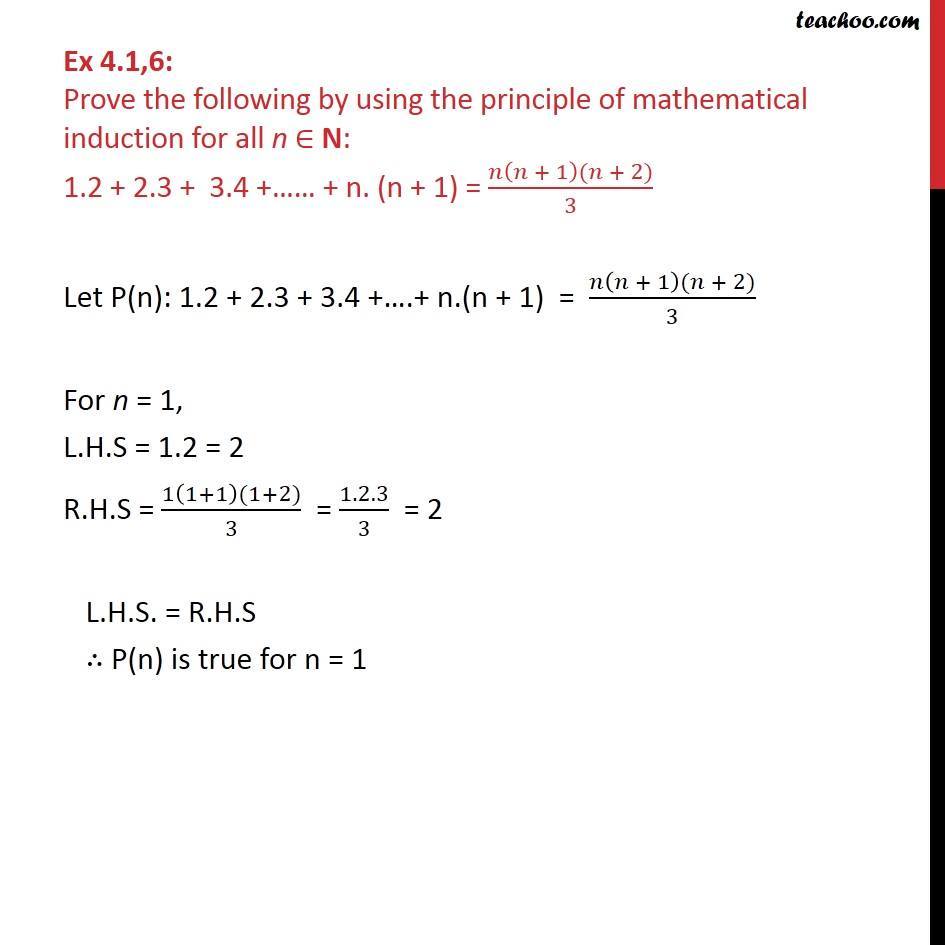
Ex 4 1 6 1 2 2 3 3 4 N N 1 N N 1 N 2 3
N^2-n+41 is prime by mathematical induction
N^2-n+41 is prime by mathematical induction- Can you check my answers?Since math2^{10}=1024>1000=10^3/math, the base case mathn=10/math is resolved Assume math2^k>k^3/math for mathk=n/math Then math2^{n1} = 2 \cdot




Mathematical Induction Online Presentation
Conclusion By the principle of induction, (1) is true for all n 2Z with n 2 5 Prove that n!Holds, but I don't know where to go after the inductive hypothesis that it holds for n>= 4 after showing it works for the base case (n = 4) Here are my steps so far 2^ (n1) < (n1)!Maths Prove by the principle of mathematical induction that 2n > n for all n ∈ N
Another viewersubmitted question Inequality proofs seem particularly difficult when they involve powers of n, but they can be managed just like any other i> Principle of Mathematical Induction > Introduction to Mathematical Induction > Prove that 2^n>n for all po maths Prove that 2 n > n for all positive integers n Easy Answer Let P (n) 2 n > n When n = 1, 2 1 > 1Hence P (1) is true Assume that P (k) is true for any positive integer k,ie,Conclusion By the principle of induction, it follows that P(n) is true for all n2N (b) Show that if a i and b i (i= 1;2;;n) are real numbers such that a i b i for all i, then i=1 a i i=1 b i (Use the fact (from Chapter 1) that a band c dimplies a c b d) Solution We will prove by induction on nthe following statement P(n) For
1Which of the following shows the best next step to prove the following by mathematical induction? Proof by Induction 2^n < n!Induction in Practice Typically, a proof by induction will not explicitly state P(n) Rather, the proof will describe P(n) implicitly and leave it to the reader to fill in the details Provided that there is sufficient detail to determine what P(n) is, that P(0) is true, and that whenever P(n) is true, P(n 1) is true, the proof is usually valid




Ex 4 1 3 Prove By Induction 1 1 1 2 1 1 2 3




Ex 4 1 6 1 2 2 3 3 4 N N 1 N N 1 N 2 3
Example 1 For all n ≥ 1, prove that 12 22 32 42 n2 = (n(n1)(2n1))/6 Let P (n) 12 22 32 42 n2 = (n(n1)(2n1))/6 For n = 1, LHS = 12 #7 Re Proof by Induction stiffy said Hi there, I am stuck on a homework problem and really need some help Use the (generalized) PMI to prove the following 2^n>n^2 for all n>4 So far all I have been able to do is show p (5) holds and assume P (k) which gives the form 2^ (K)>k^2 This is where I am stuck;I'm going to define a function s of N and I'm going to define it as the sum the sum of all positive integers positive integers integers including n including including n and so the domain of this function is really all positive integers and has to be a positive integer and so we can try it out with a few things we could take s of 3 this is going to be equal to 1 plus 2 plus 3 which is equal to



Users Math Msu Edu Users Zhan Hw1 Solution Pdf




Example 2 Prove 2n N Chapter 4 Mathematical Induction
(n1)2 = n2nn1 = n22n1 1357 = 42 Chapter 4 Proofs by Induction I think some intuition leaks out in every step of an induction proof — Jim Propp, talk at AMS special session, January 00 The principle of induction and the related principle of strong induction have been introduced in the previous chapter However, it takes a bit of The point of a proof by induction is that it allows us to prove infinitely many statements in a finite number of steps The statements you need to prove are n Explanation using the method of proof by induction this involves the following steps ∙ prove true for some value, say n = 1 ∙ assume the result is true for n = k ∙ prove true for n = k 1 n = 1 → LH S = 12 = 1 and RHS = 1 6 (1 1)(2 1) = 1 ⇒result is true for n = 1




Proof Of Finite Arithmetic Series Formula By Induction Video Khan Academy




Program Correctness By Justin Reschke 10 5 04
A proof by induction consists of two cases The first, the base case (or basis), proves the statement for n = 0 without assuming any knowledge of other cases The second case, the induction step, proves that if the statement holds for any given case n = k, then it must also hold for the next case n = k 1 These two steps establish that the statement holds for every natural number n> 2n for n 4 Proof We will prove by induction that n! (n1)^2 n =n^2 n2 is incorrect You stated n^2 n2 > n1 > 2 for n≥2 as a fact The title of the thread is "Induction proof of n^2>n1" This happens a lot with homework questions about induction Usually the students are using induction to prove X because they were told to do "prove X using induction"




Proof Principle Of Mathematical Induction 22 Explained How To Show 1 2 2 2 3 2 N 2 Nn 12n 1 6 Youtube




Proof By Induction The Sum Of The First N Natural Numbers Is N N 1 2 Youtube
• Mathematical induction is valid because of the well ordering property • Proof –Suppose that P(1) holds and P(k) →P(k 1) is true for all positive integers k –Assume there is at least one positive integer n for which P(n) is false Then the set S of positive integers for which P(n) is false is nonempty –By the wellordering property, S has a least element, say mIn this video I give a proof by induction to show that 2^n is greater than n^2 Proofs with inequalities and induction take a lot of effort to learn and areProofs by Induction A proof by induction is just like an ordinary proof in which every step must be justified However it employs a neat trick which allows you to prove a statement about an arbitrary number n by first proving it is true when n is 1 and then assuming it is true for n=k and showing it is true for n
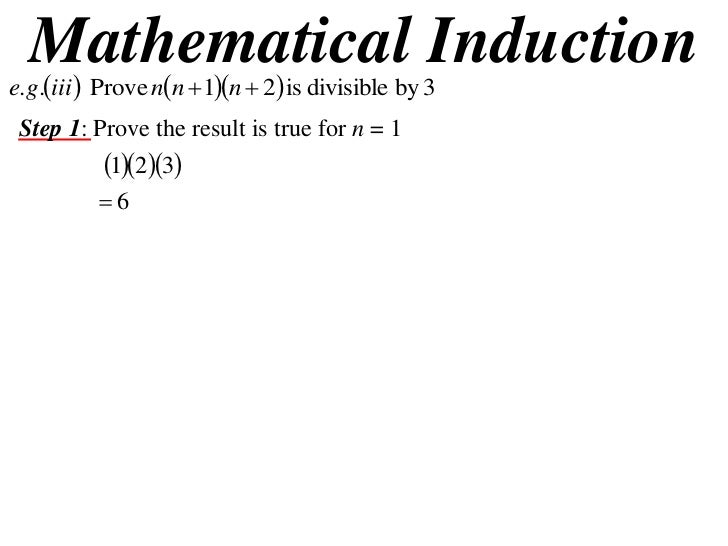



11x1 T14 09 Mathematical Induction 2 10



For All N N By Using Principle Of Mathematical Induction Then Prove That 1 3 2 4 N N 2 N N 1 2n 7 6 Sarthaks Econnect Largest Online Education Community
That is how Mathematical Induction works In the world of numbers we say Step 1 Show it is true for first case, usually n=1;How to Do it Step 1 is usually easy, we just have to prove it is true for n=1 Step 2 is best done this way Assume it is true for n(*) For n > 5, 4n < 2 n This one doesn't start at n = 1 , and involves an inequality instead of an equation (If you graph 4 x and 2 x on the same axes, you'll see why we have to start at n = 5 , instead of the customary n = 1 )




Using The Principle Of Mathematical Induction Prove That 1 1




Prove By Induction 1 2 2 2 3 2 4 2 N 2 N N 1 2n 1 6
We will prove the statement using mathematical induction STEP 1 In this step, we check if the statement is true for n = 1 1 3 5 7 ⋯ (2n1) = 1 n 2 = (1) 2 = 1 LHS = RHS The statement is true for n = 1 STEP 1 Let the statement be true for n = k, k ∈ N Although we won't show examples here, there are induction proofs that require strong induction This occurs when proving it for the ( n 1 ) t h {\displaystyle (n1)^{\mathrm {th} }} case requires assuming more than just the n t h {\displaystyle n^{\mathrm {th} }} caseI am a CS undergrad and I'm studying for the finals in college and I saw this question in an exercise list Prove, using mathematical induction, that $2^n > n^2$ for all integer n greater than $4$




Ncert Solutions For Class 9 10 11 And 12 Prove The Following By Using The Principle Of Mathematical Induction For All N N
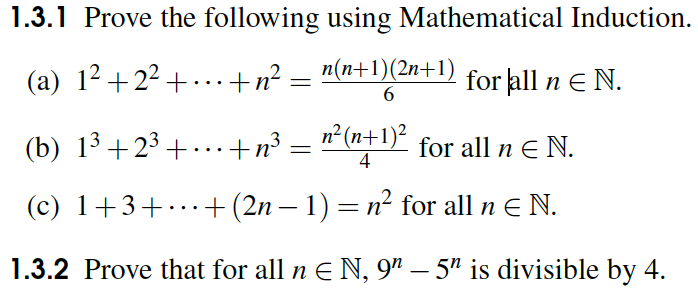



Prove The Following Using Mathematical Induction Chegg Com
Is greater than 2^n using Mathematical Induction Inequality ProofPlease Subscribe here, thank you!!!Step 2 Show that if n=k is true then n=k1 is also true;




Ex 4 1 4 Prove 1 2 3 2 3 4 N N 1 N 2 N N 1



Use Mathematical Induction To Prove That The Statements Are True For Every Positive Integer N 1 3 2 4 3 5 A N N 2 N N 1 2n 7 6 Schooltrainer Com
Take n elements and count how many ways there are to put these two elements into 2 different containers (A and B) a) Every element can take two states it's either in A or in B By one of the first theorems in combinatorics (the one about separating a task into steps), this gives n steps with 2 options at each step, so we get $2^n$Free Induction Calculator prove series value by induction step by step This website uses cookies to ensure you get the best experience By using this website, you agree to our Cookie PolicyI'm to prove that for n>=4, 2^n < n!
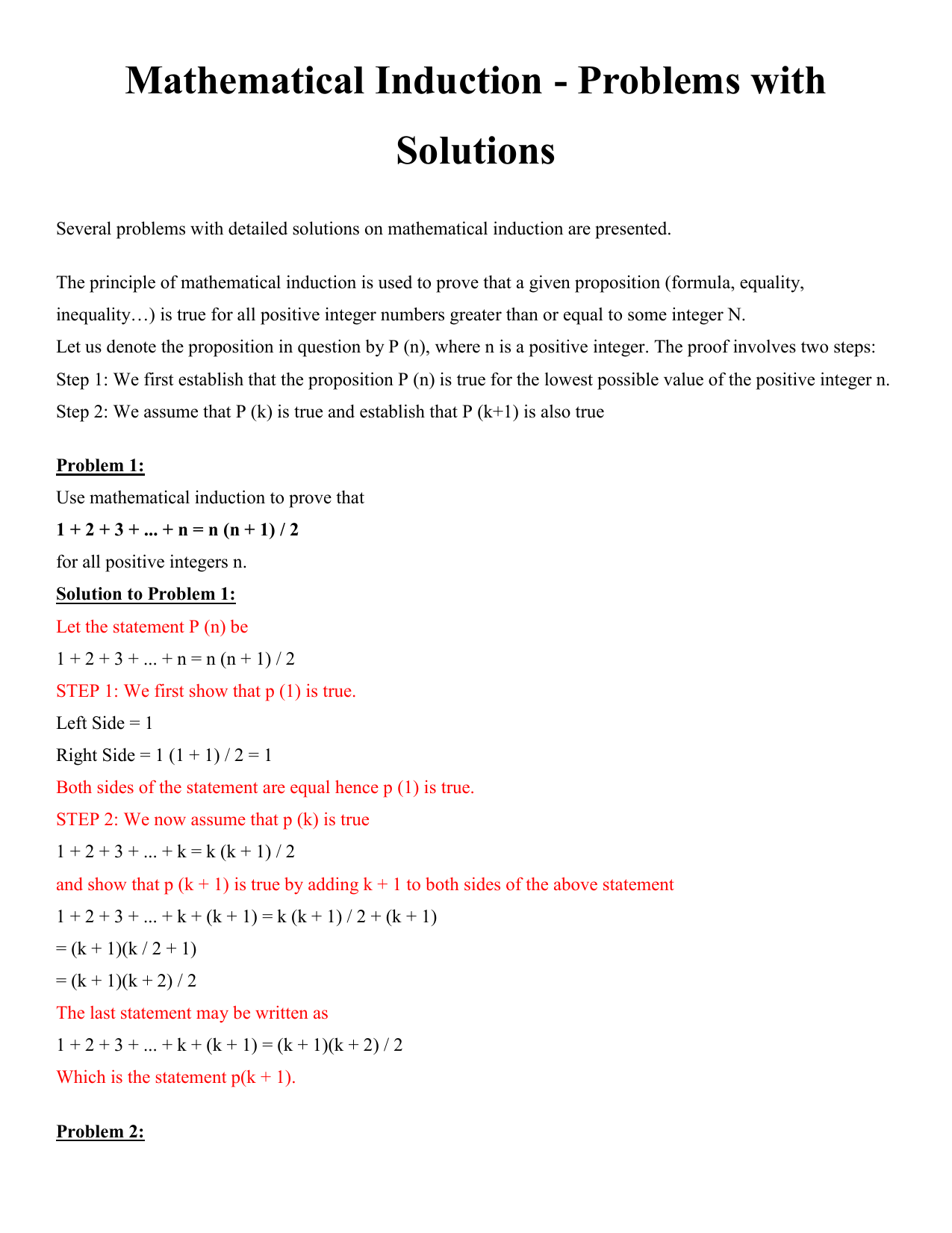



Mathematical Induction




Prove That N N 1 N 2 Is Divisible By 6 Principle Of Mathematical Induction Youtube
Question Prove 2^n > N^2 By Induction Using A Basis > 4 Basis N = 5 210 O ^2 > 25 Assume O>^0 Prove 2^(n1) > This problem has been solved!H(n,6 − r − s,s) Altogether, this takes 2n − 1 1 2n −1 = 2n1 −1 steps 11 A Matching Lower Bound Theorem Any algorithm to move n rings from pole r to pole s requires at least 2n −1 steps Proof By induction, taking the statement of the theorem to be P(n) Basis Easy Clearly it requires (at least) 1 step to moveFrom the Principle of Induction, n < 2n for any natural number n Quiz Which of the following properties is not necessary for a natural number n to be divisible by 10?




2 N N 2 For All Integers N 4 A Proof By Induction Album On Imgur




Get Answer Prove The Following Problem Using Mathematical Induction 1 2 3 Transtutors
Transcript Prove 1 2 3 n = (n(n1))/2 for n, n is a natural number Step 1 Let P(n) (the given statement)\ Let P(n) 1 2 3 n = (n(n1))/2 Step(a) 10 divides n2, (b) divides 4n, (c) 5 divides n/2, (d) 100 divides 2n Section 3 Further Examples 13 Exercise 4 Use the Principle of Induction to prove the following 2 4 6 2n = n^2 n for all natural numbers n asked in Mathematical Induction by Chandan01 ( 512k points) principle of mathematical induction




Proof By Induction N 5 2 N 2n N Mathematics Stack Exchange
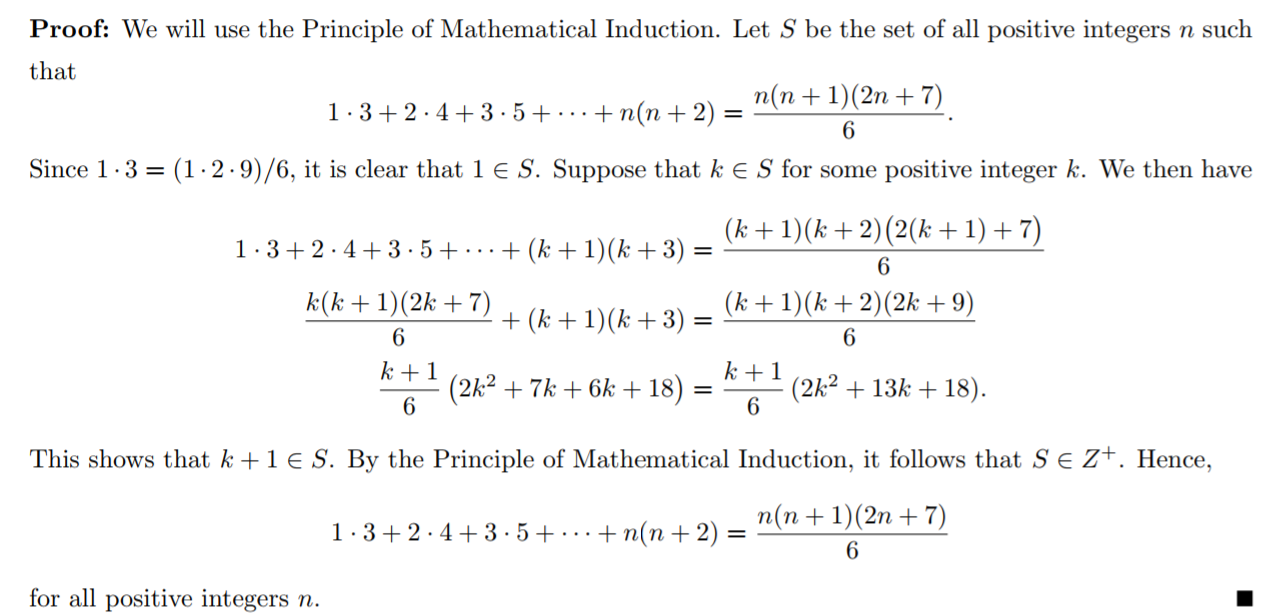



Prove By The Principle Of Mathematical Induction 1 3 2 4 3 5 N N 2 N N 1 2n 7 6
P(n) = "the sum of the first n powers of 2 (starting at 0) is 2 n1" Theorem P(n) holds for all n ≥ 1 Proof By induction on n • Base case n =1 Sum of first 1 power of 2 is 2 0, which equals 1 = 2 1 1 • Inductive case – Assume the sum of the first k powers of 2 is 2 k1 – Show the sum of the first (k 1) powers of 2Help is much appreciated, thanksAll the other answers here already stated how to prove your statement true for all Natural Number using induction But since you didn't mention the set of possible values of n (although n is commonly used as the notation for an unknown natural num
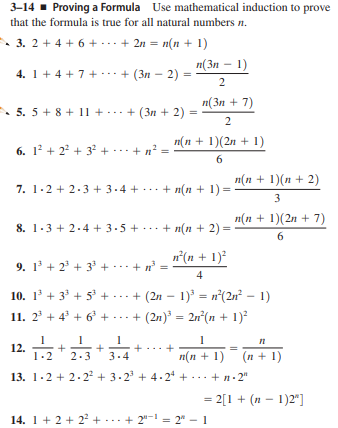



Answered 3 14 Proving A Formula Use Bartleby




Rd Sharma Solutions For Class 11 Maths Updated 21 22 Chapter 12 Mathematical Induction Download Free Pdf
Suppose you have mathn/math candies in front of you You are given the choice to either choose a candy or leave it You may choose no candy and leave or choose all of them Then the total number of ways you can choose is If you choose none mThe function 2 n 2 n − 1 is surely higher than 2 n − 1 so if n < 2 n is true (induction step), n < 2 n 2 n − 1 has to be true as well Is this valid argumentation?42 MATHEMATICAL INDUCTION 64 Example Prove that every integer n ≥ 2 is prime or a product of primes Answer 1 Basis Step 2 is a prime number, so the property holds for n = 2 2 Inductive Step Assume that if 2 ≤ k ≤ n, then k is a prime number or a product of primes Now, either n 1 is a prime number or it is not If it is a prime number then it verifies the




1 Principle Of Mathematical Induction Prove 1 2 3 N N N 1 2 Maths Hsc Using Proof By Induction Youtube




Prove 1 2 3 N N N 1 2 Mathematical Induction
Mathematical Induction Proof Here is a more reasonable use of mathematical induction Show that, given any positive integer n, n 3 2 n yields an answer divisible by 3 So our property P is n 3 2 n is divisible by 3 Go through the first two of your three steps Is the set of integers for n> 2n holds for all n 4 Base case Our base case here is the rst nvalue for which is claimed, ie, n = 4 For n = 4,2* (2^n) < (n1) (n!) but I dont' know where to now!




By Using Principle Of Mathematical Induction Prove That 2 4 6 2n N N 1 N In N Youtube
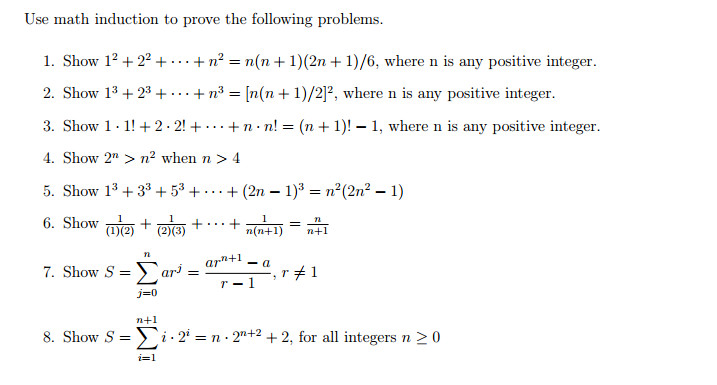



Use Math Induction To Prove The Following Problems Chegg Com
3^n>n*2^n, n≥1 1When n=1, the formula is valid because 3^1 1*2^1 3>2 2Assuming that 3^k>k*2^k math Using Mathematical Induction, prove the following a) 6^n 1 is divisible by 5, for n>_0In this video I demonstrate that the equation 1 2 2^2 2^3 2^(n1) = 2^n 1 for all positive integers using mathematical induction The first sAbout Press Copyright Contact us Creators Advertise Developers Terms Privacy Policy & Safety How works Test new features Press Copyright Contact us Creators
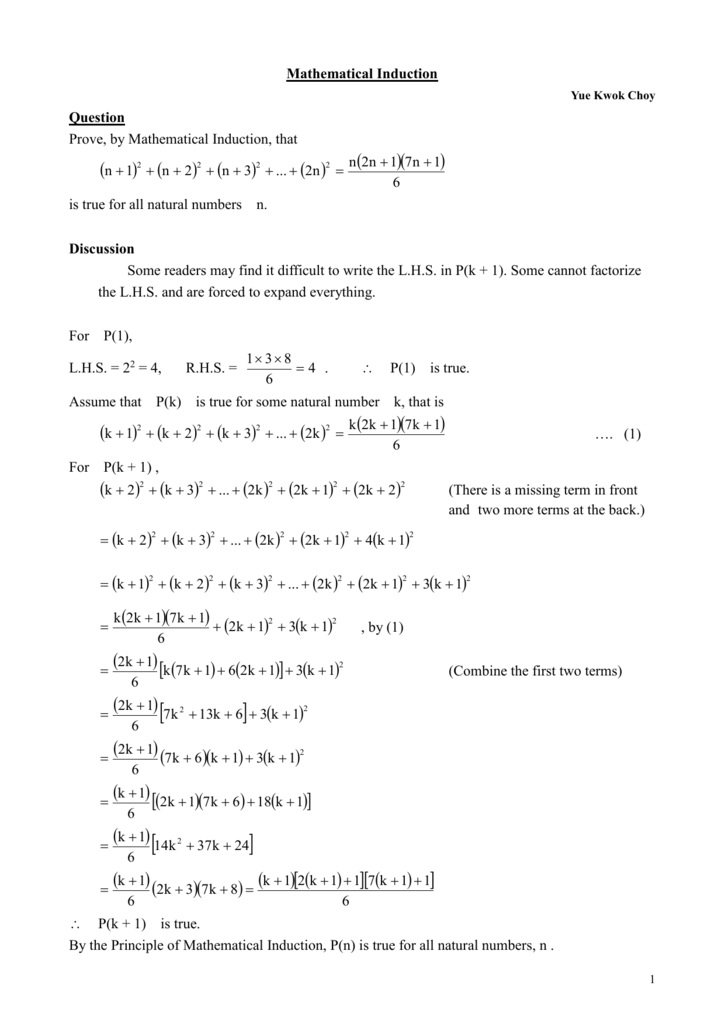



Mathematical Induction Doc




Lecture 4 5 Mathematical Induction And Fibonacci Sequences Ppt Download




Prove By The Method Of Induction For All N Belongs To N 1 2 2 2 3 2 N 2 N N 1 2n 1 6 Brainly In



Prove That 1 2 2 3 3 4 N N 1 N N 1 N 2 3 N N By Using Principal Of Mathematical Induction Sarthaks Econnect Largest Online Education Community




Induction Inequality Proof Example 5 2 N N Youtube
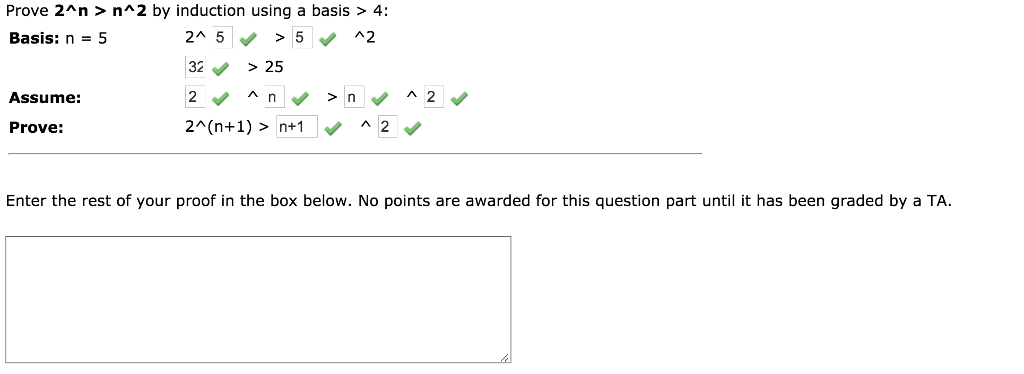



Prove 2an N2 By Induction Using A Basis 4 Basis Chegg Com
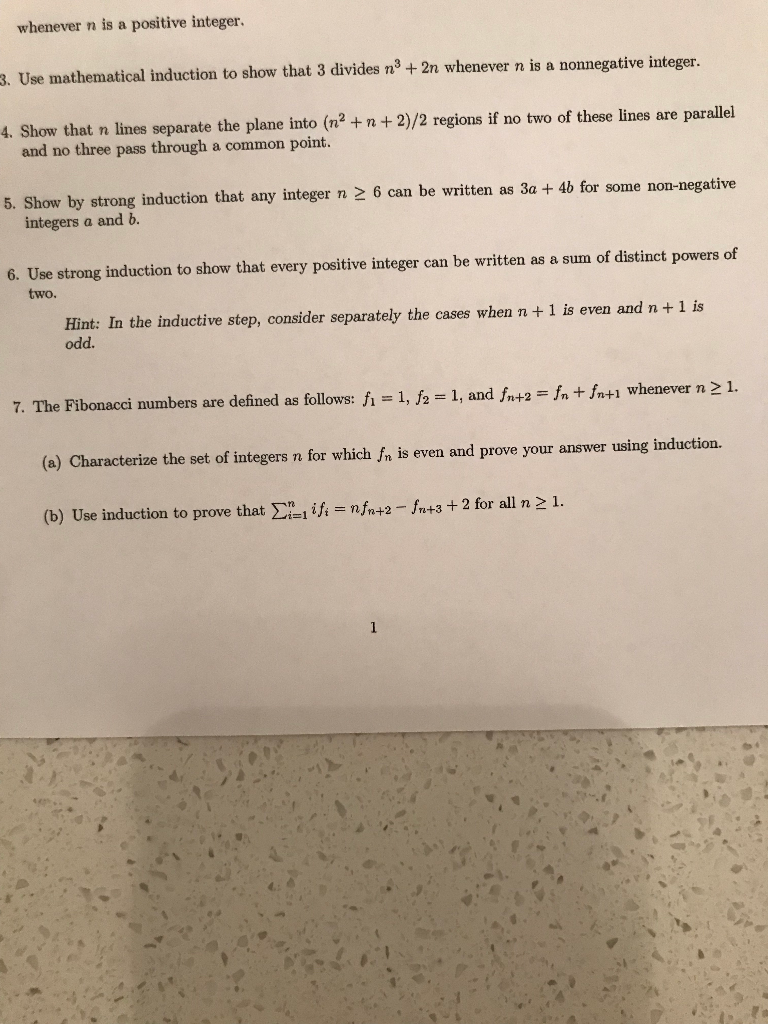



Solved Whenever N Positive Integer 3 Use Mathematical Induction Show 3 Divides N3 2n Whenever N N Q




Mathematical Induction Proof 1 Sqrt1 1 Sqrt2 1 Sqrt N Ge Sqrt N Mathematics Stack Exchange




Prove That N 2 N In Divisible By 2 For Any Positive Length N




Prove The Following By Using The Principle Of Mathematical Induction For All N N 1 1 2 3 1 2 3 4 1 3 4 5 1 N N 1 N 2 N N 3 4 N 1 N 2 Mathematics Shaalaa Com
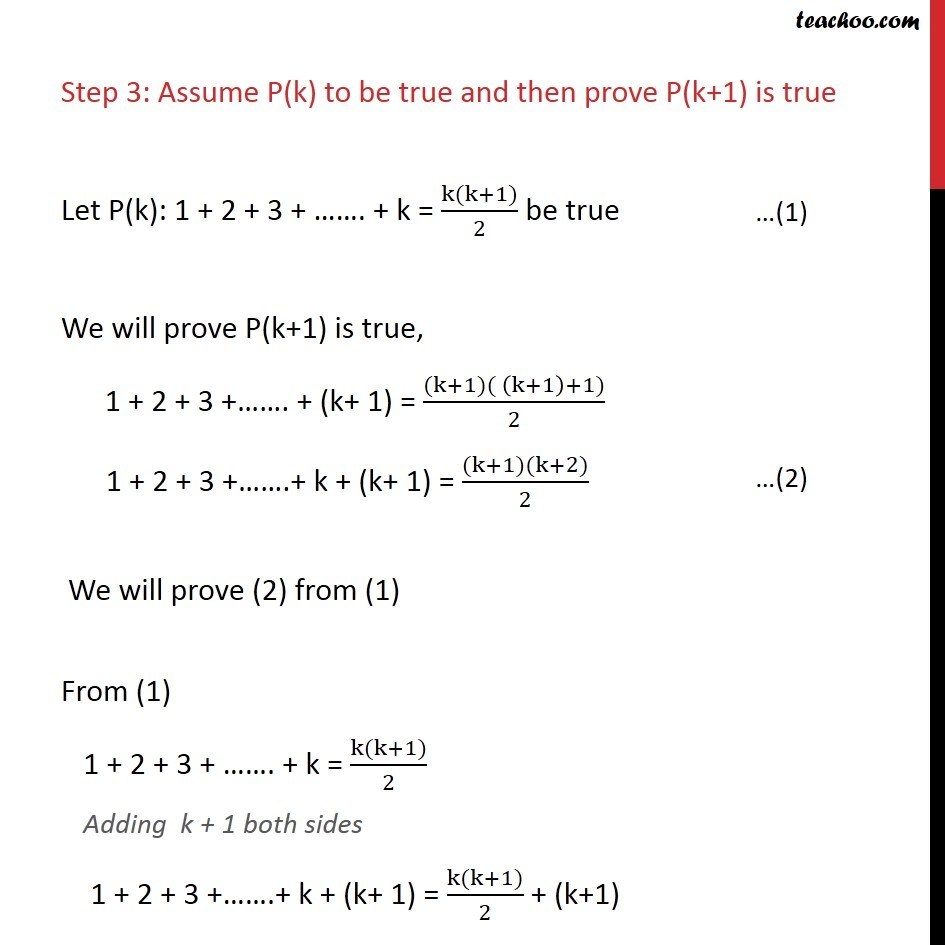



Prove 1 2 3 N N N 1 2 Mathematical Induction




Induction Help Prove 2n 1 2 N For All N Greater Than Or Equal To 3 Mathematics Stack Exchange



Prove By Mathematical Induction N N 2 5 Is Divisible By 6 For Each Natural Number Studyrankersonline
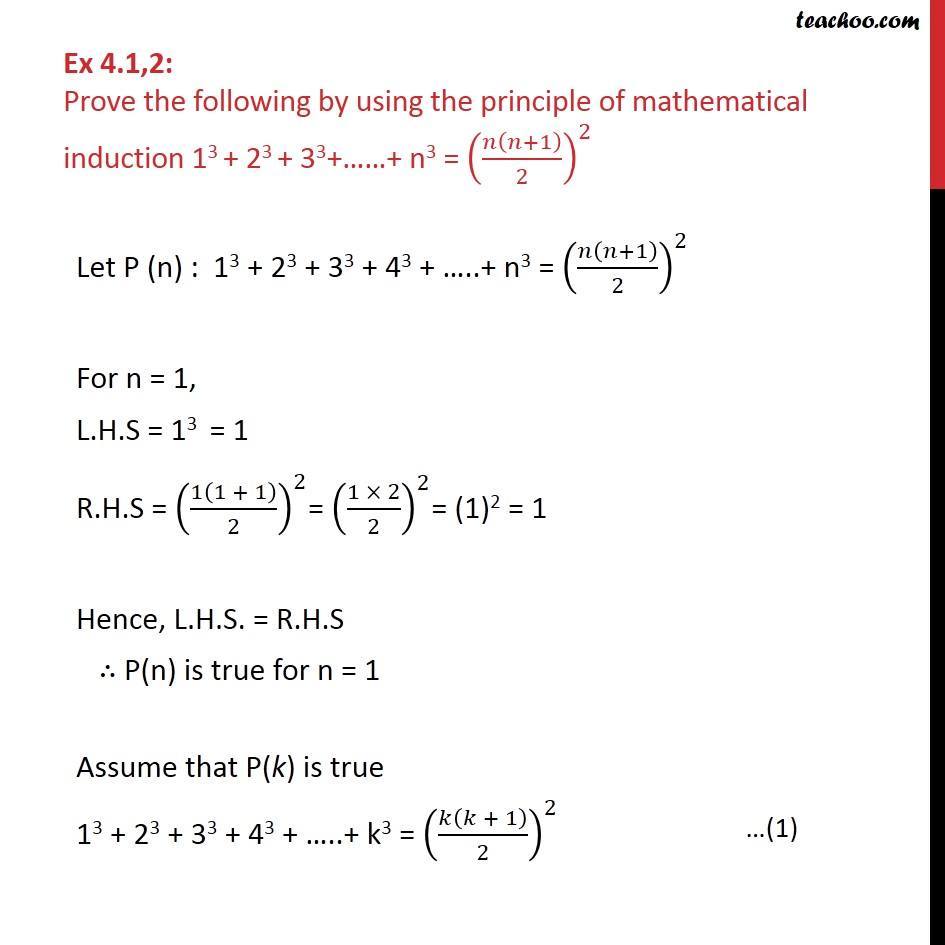



Prove That 1 3 2 3 3 3 N 3 N N 1 2 2 Teachoo
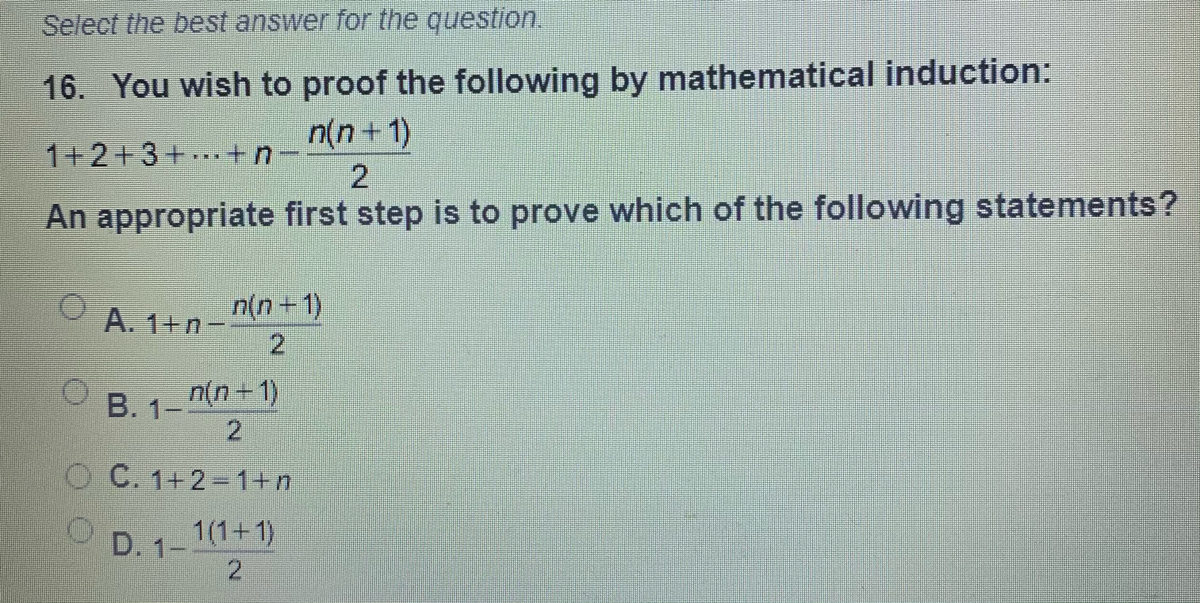



Answered 16 You Wish To Proof The Following By Bartleby




Prove The Following By Using The Principle Of Mathematical Induction For All N N 1 2 3 2 3 4 N N 1 N 2 N N 1 N 2 N 3 4
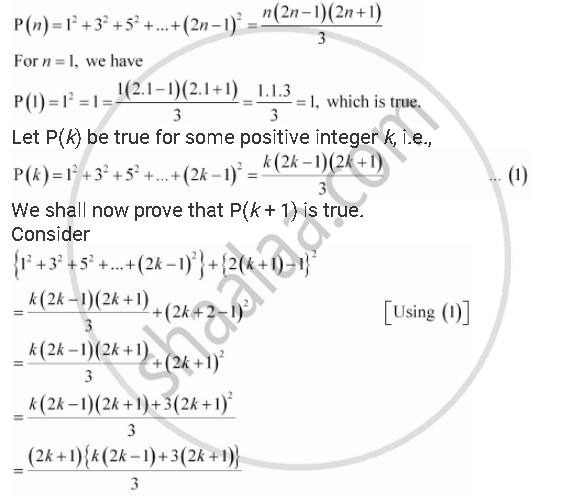



Prove The Following By Using The Principle Of Mathematical Induction For All N N 1 2 3 2 5 2 2n 1 2 N 2n 1 2n 1 3 Mathematics Shaalaa Com




Mathematical Induction Induction Is The Most Important Proof




8 Proof By Induction S K 2 N N 1 2n 1 6 Discrete Principle Induccion Matematicas Mathgotserved Youtube




15 Proof Prove Induction 2 N Is Greater Than To 1 N Inequality Induccion Matematicas Mathgotserved Youtube




4 Mathematical Induction 1 Prove That 1 1 2 2 3 3 N N N 1 1 For Every Integer N 1 Homeworklib




Example 2 Prove 2n N Chapter 4 Mathematical Induction




Prove Using Mathematical Induction That 2 3n 3 N Is Divisible By 5 For All N 1 Mathematics Stack Exchange



How Is This Proved By Mathematical Induction 1 2 2 2 3 2 2n 2 N 2n 1 4n 1 3 For The First 2n Positive Integers Quora




Using The Principle Of Mathematical Induction Prove That 1 1




By Using Principle Of Mathematical Induction Prove That 2 4 6 2




11 Proof By Induction S K N N 1 2 Maths For All Positive Year 12 Hsc Extension 1 Youtube




Prove N Is Greater Than 2 N Using Mathematical Induction Inequality Proof Youtube



3



Using The Principle Of Mathematical Induction For All N N Prove That 1 2 2 3 3 4 N N 1 N N 1 N 2 3 Sarthaks Econnect Largest Online Education Community
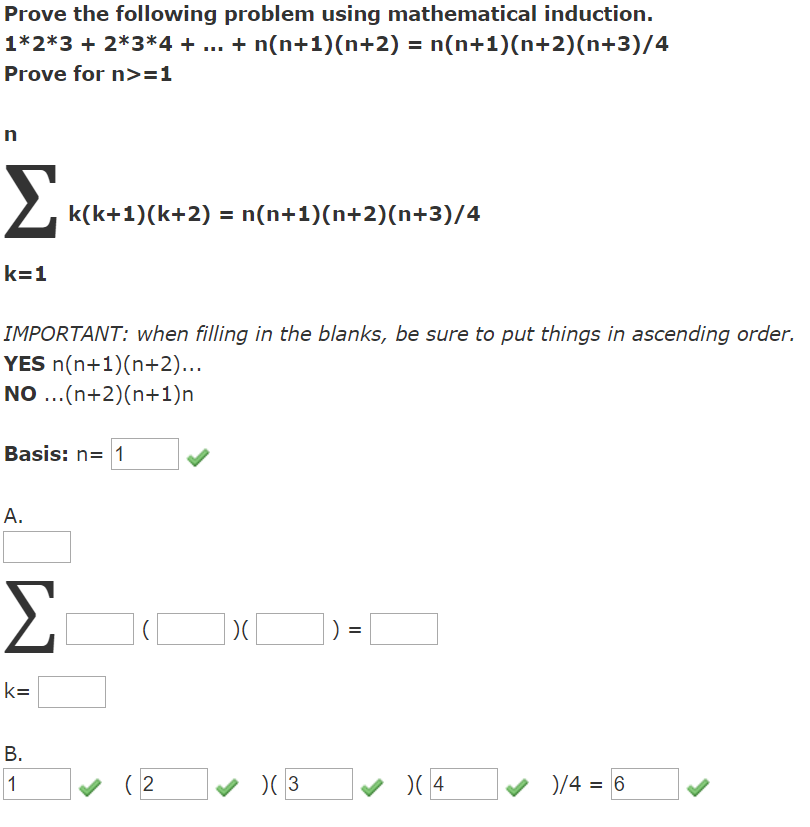



Prove The Following Problem Using Chegg Com
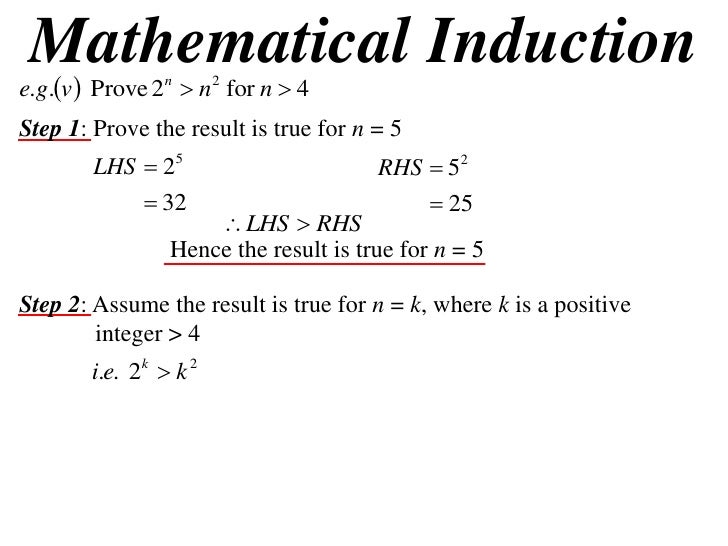



11x1 T14 10 Mathematical Induction 3 10




Proof That 2 N Is Greater Than N Youtube




Solved Use The Principle Of Mathematical Induction To Prove That 2 N 2 1 Answer Transtutors



Faculty Math Illinois Edu Hildebr 213 Inductionsampler Pdf




Prove By Induction That The Product N N 1 N 2 N R 1 Of Any Consecutive R Numbers Is Divisible By R
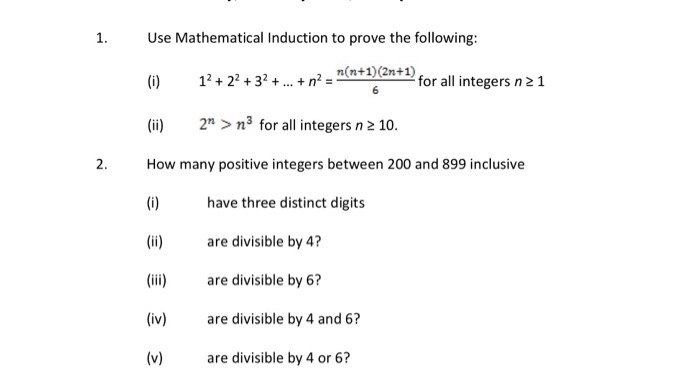



1 Use Mathematical Induction To Prove The Following Chegg Com




Proof With Mathematical Induction That Frac N N 1 2 Frac N 1 N 2 2 Frac 2n 1 2n 2 Le N 0 7 Mathematics Stack Exchange
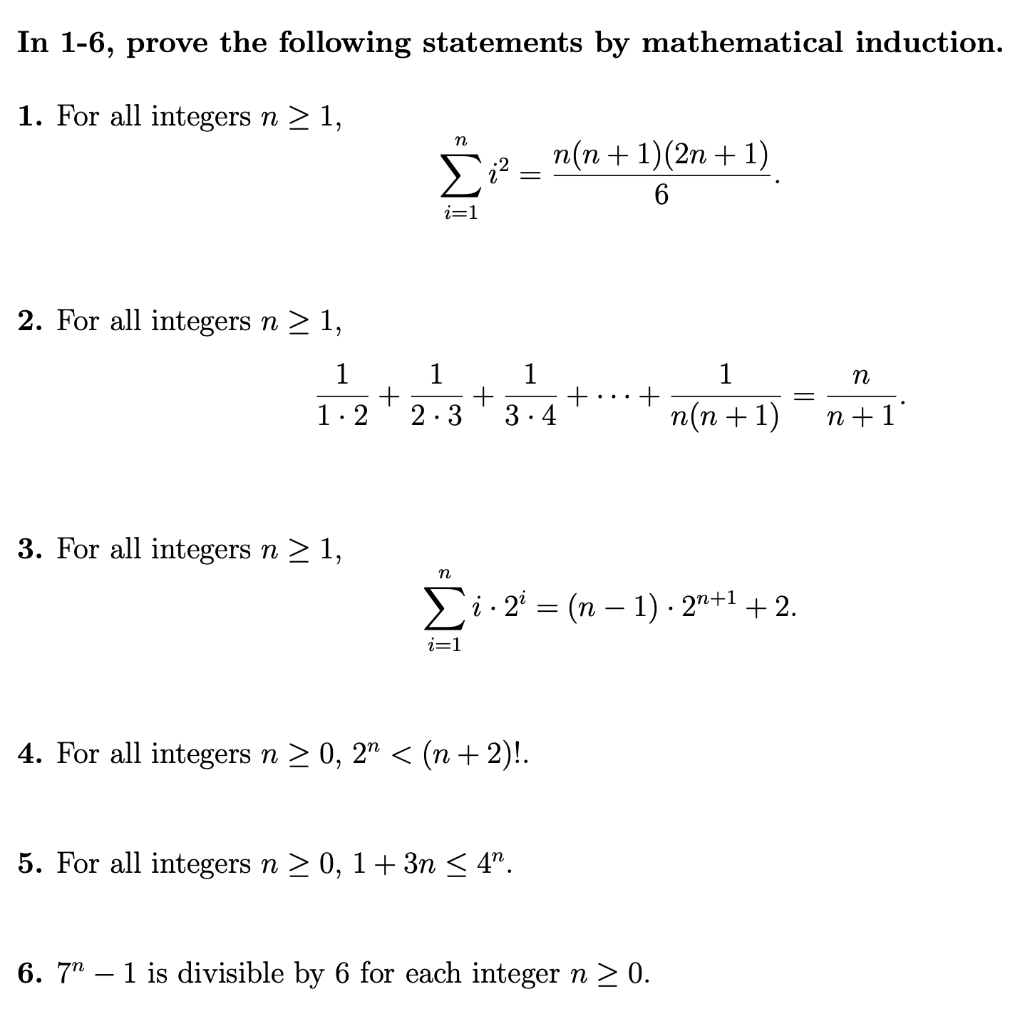



In 1 6 Prove The Following Statements By Chegg Com




Why Are Two Base Cases Needed To Prove That N 2 N For All N Geq 0 Mathematics Stack Exchange
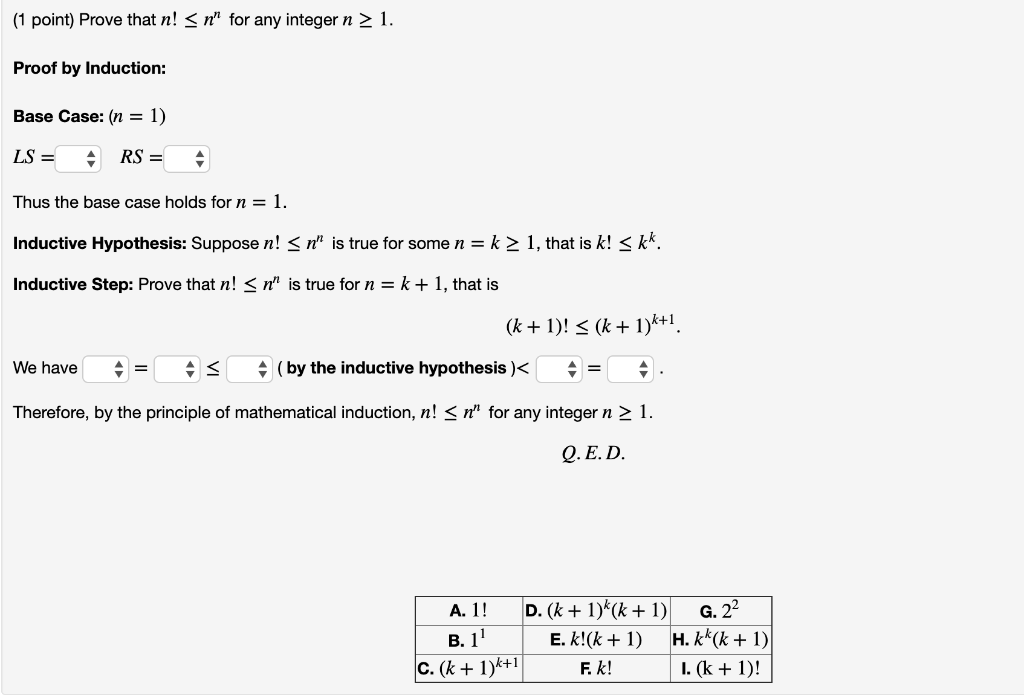



1 Point Prove That N N For Any Integer N 2 1 Chegg Com




Induction Inequality Proof Example 6 2 2n N 2 2n Youtube




Prove By Induction 1 2 2 2 3 2 4 2 N 2 N N 1 2n 1 6



How To Prove By Principle Of Mathematical Induction That For All Integers Math N Ge 1 Math Math 1 Cdot 1 2 Cdot 2 3 Cdot 3 Ldots N Cdot N N 1 1 Quora




Mathematical Induction Online Presentation
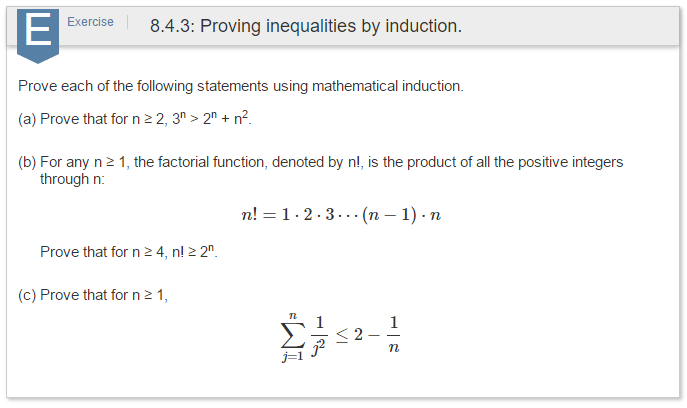



Prove Each Of The Following Statements Using Chegg Com
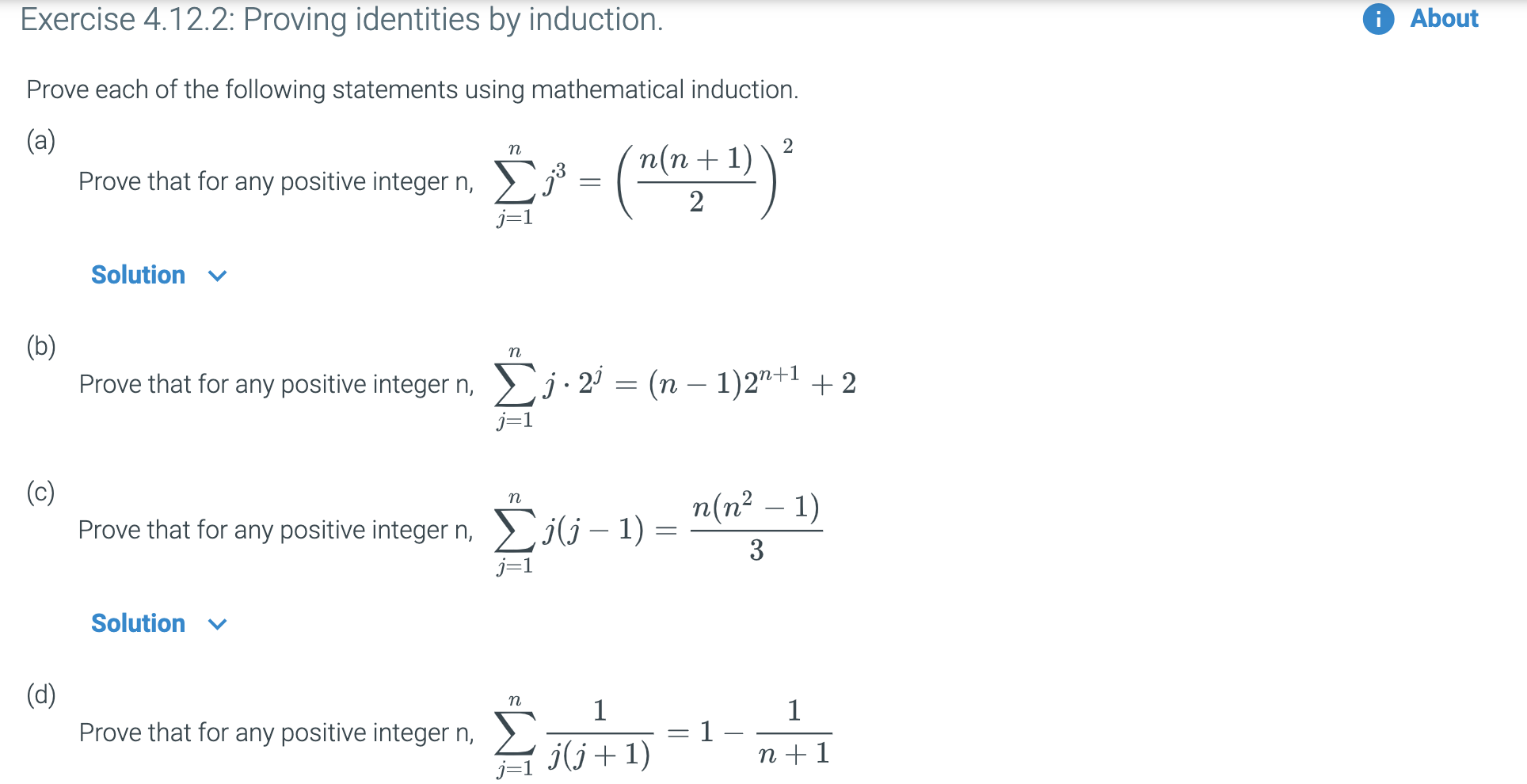



Exercise 4 12 2 Proving Identities By Induction Chegg Com




11 18 Prove By Induction The Following Results For Chegg Com




Mathematical Proof Methods Of Proof Proof By Induction Wikibooks Open Books For An Open World




Proving N Ge 2 N 1 For All N Ge1 By Mathematical Induction Mathematics Stack Exchange




Follow Me For A Walk Through Mathematical Induction




Mathematical Induction Online Presentation



1




Prove 2n 1 Le 2 N By Induction Mathematics Stack Exchange




Inequality Mathematical Induction Proof 2 N Greater Than N 2 Youtube



1




Proving Sn N 1 N N 1 N 2 3 Using Mathematical Induction Youtube
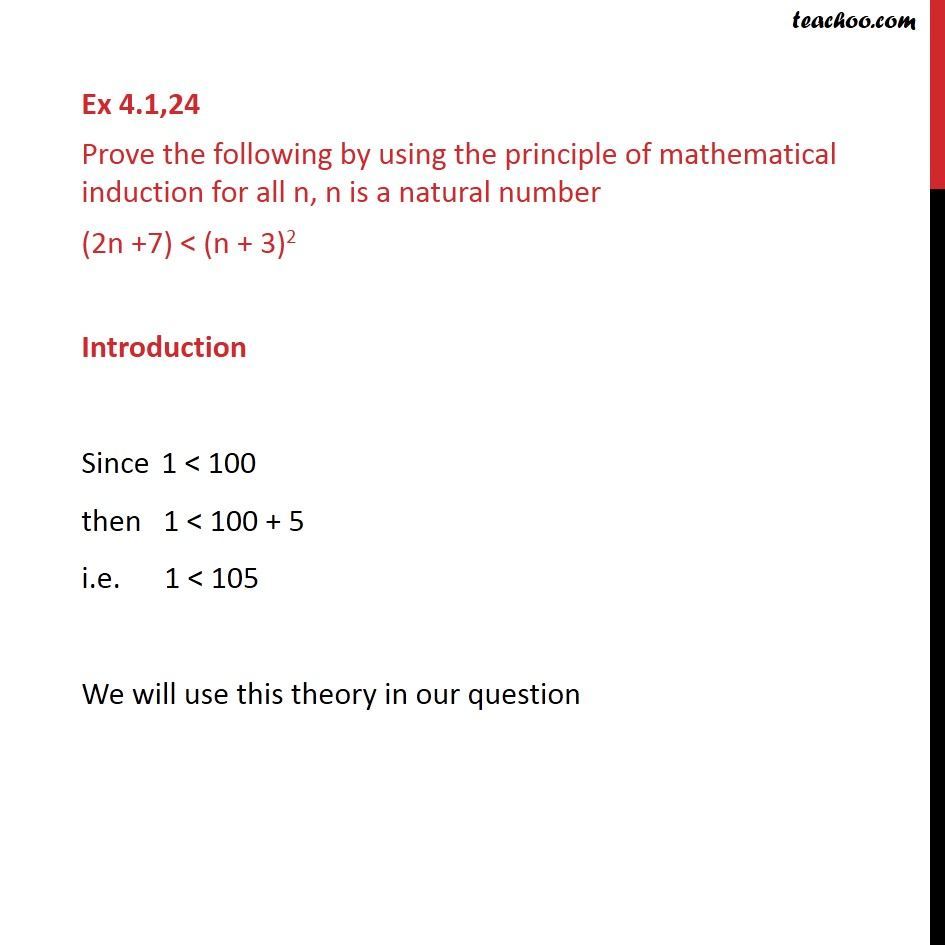



Ex 4 1 24 Prove 2n 7 N 3 2 Chapter 4 Induction
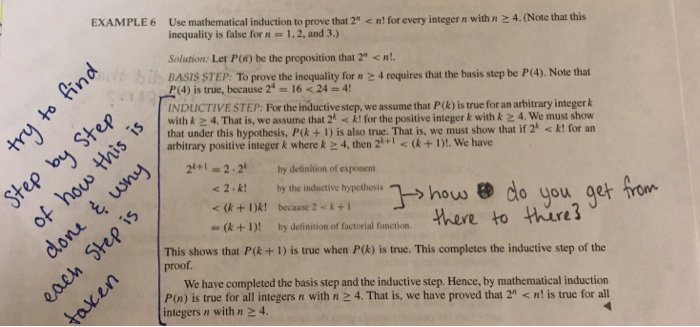



Use Mathematical Induction To Prove That 2 N Lt N Chegg Com




Prove 2 N Is Greater Than N Youtube



Prove By Mathematical Induction 1 2 2 2 3 2 N 2 N N 1 2n 1 6 N N Sarthaks Econnect Largest Online Education Community



How To Prove 1 2 3 N Terms N N 1 2 Quora




Prove Using Induction N 2 7n 12 Geq 0 Where N Geq 3 Mathematics Stack Exchange




Solved A Prove By Mathematical Induction That N 2 N 1 Forall N 1 Answer Transtutors



1




Example 2 Prove 2n N Chapter 4 Mathematical Induction




n2 Formula Proof
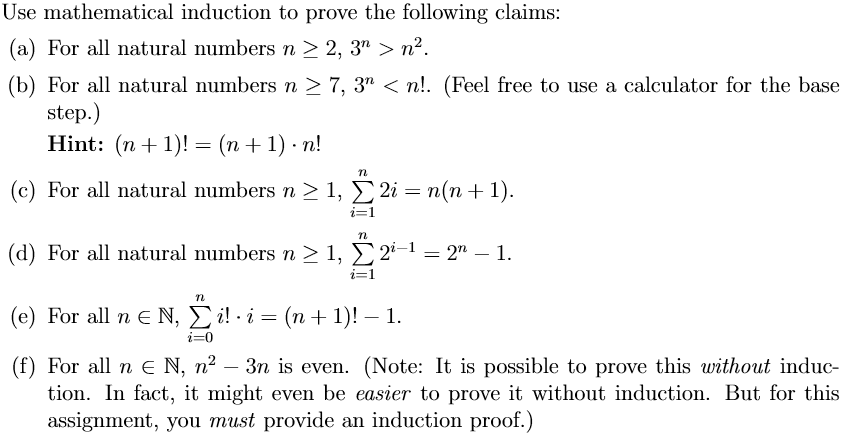



Use Mathematical Induction To Prove The Following Chegg Com




Prove That 2 N Nfor All Positive Integers N




1 2 2 3 3 4 N N 1 Formula Novocom Top




Use Mathematical Induction To Prove The Following N N 1 N 2 34 1 N N Y N Homeworklib




Mathematical Induction Online Presentation




Prove That 1 2 2 2 3 2 1 N 1 N 2 1 N 1 Frac N N 1 2 Whenever N Is A Positive Integer Using Mathematical Induction Mathematics Stack Exchange




Please Help Me With 1 5 A And B 6 And 7 Exercises 1 3 1 Homeworklib




Prove The Following By The Principle Of Mathematical Induction




Follow Me For A Walk Through Mathematical Induction



0 件のコメント:
コメントを投稿